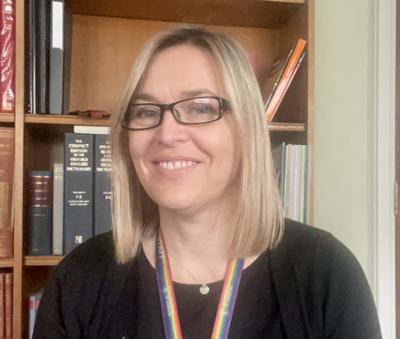
Contact details
- Name:
- Sara Charles
- Qualifications:
- BA, MA (Library and Information Studies) with distinction, UCL, MRes (History of the Book) with distinction, University of London
- Position:
- Editor of Historical Research and Journals Manager for University of London Press
- Institute:
- Institute of Historical Research
- Email address:
- Sara.Charles@sas.ac.uk
- Website:
- www.teachingmanuscripts.com
Research Summary and Profile
- Research interests:
- History, History of art, History of the book, Manuscript studies, Medieval History, Palaeography
- Regions:
- England, Europe, Ireland, Scotland, Wales
- Summary of research interests and expertise:
-
Medieval manuscript making, medieval materials, practice-based research
- Languages:
-
Spoken Written Latin - Good
- Publication Details
-
Related publications/articles:
Date Details 08-Apr-2024 The Medieval Scriptorium: How Medieval Manuscripts Were Made Monographs
03-Jan-2023 Family and Friends: Gift Giving, Books, and Book Inscriptions in Women's Religious Communities Chapters
Gift-giving to women’s religious communities in the form of books demonstrates strong relationships between women religious and their patrons, each other, and families. Women religious were expected to renounce all worldly goods upon entering a monastic community; however, individuals and communities would have needed access to liturgical and sacred texts for both personal and communal devotion. The physical comfort of an inherited book can be measured in terms of emotional weight; the tactile relationship between holding a book in one’s hand that had also been cradled by a loved one creates a tangible connection. Moreover, personal inscriptions in books are something that kept a vital link with the outside world and served as a constant reminder of close relationships, even in an environment that endeavoured to limit contact. This chapter examines the importance of gift giving, particularly books, in the later medieval period in England, and how patrons, benefactors, and family ensured they were remembered both by individual women religious as well as the monastic community. It further explores the importance of women and book networks, through the gift-giving of books within a religious community, with examples of inscriptions between religious women. Finally, inscriptions from family members are examined through the emotive prism of gift-giving, and the palpable connections with loved ones through the physical object of the book.
07-May-2020 Litterae florissae in English Manuscripts in the Late Twelfth/Early Thirteenth Century Articles
This article examines a group of manuscripts produced in England in the late twelfth/early thirteenth century and compares their artistic penwork, particularly looking at litterae florissae and linefillers. Some of these manuscripts have already been linked by their decorated initials, and were thought to be produced in a workshop in Oxford. By looking closely at the style of flourished letters, it was possible to identify a precise standard of creating letterforms, further linking these manuscripts to one production centre in Oxford. English litterae florissae and linefiller styles have not received much academic analysis to date, but finding similarities between letter styles has the potential to provide further identification for manuscript production and workshop standards.
25-Jun-2018 Provenance Evidence from Vesalius's De humani corporis fabrica libri Septem (1543 and 1555) and De humani corporis fabrica librorum epitome (1543) in the British Library and University College London Articles
This article looks at the 1543 and 1555 copies of Vesalius's De humani corporis fabrica in the British Library and University College London. The texts were examined for provenance information, looking at copy-specific evidence to investigate the ownership history from the sixteenth to the nineteenth century. A wide range of provenance methods were explored to extract relevant information on use, readership, and ownership, considering how far these texts were used as practical medical textbooks, especially after the rise of book collecting in the eighteenth century. The collection habits of notable figures such as Sir Hans Sloane and Joseph Smith are considered through their ownership of medical texts. A previously unrecorded book stamp is also identified. This case study supports recent census research on Vesalius texts, suggesting that its readership was varied, and was not limited to an elite audience merely for display purposes.
01-Jan-2017 The Literacy of English Nuns in the Early Thirteenth Century : Evidence from London, British Library, Cotton MS Claudius D. III Articles
This study addresses the issue of female literacy amongst religious women in England in the early thirteenth century. Evidence exists for respected and well-educated women such as Hild of Whitby and the Bonifacian correspondents in the early medieval period, yet there is little evidence for women contributing to theological discussions or being educated in religious texts after the mid-tenth century monastic reform. However, London, British Library, Cotton MS Claudius D. iii was produced c. 1220 for a female community, and contains the earliest intact version of a bilingual Rule of Saint Benedict adapted for women in both Latin and English. This article examines the manuscript textually and compares it to the masculine version of the Rule of Saint Benedict, and to its Latin counterpart for alterations such as additions or omissions, and word changes. More detailed attention is given to chapters giving instruction on reading and literacy to assess whether the text assumed a high or basic level of understanding. It is argued that changes in chapters relating to reading demonstrate that attitudes towards women’s literacy were positive, and assume a solid base of learning.
- Professional Affiliations
-
Professional affiliations:
Name Activity Royal Historical Society Fellow - Relevant Events
-
Related events:
Date Details 18-Apr-2023 Making Medieval Manuscripts Funded by the University of London Knowledge Exchange, Sara Charles and Steve Lawes will host a six-week workshop on medieval manuscripts with Green Shoes Arts. Green Shoes Arts is a charity that provides wellbeing through creativity for its local community. The participants of the workshop will make medieval ink, cut quills, paint and illuminate with medieval pigments and gold and learn how to create knotwork, culminating in a final piece on parchment.
- Consultancy & Media
-
- Available for consultancy:
- Yes